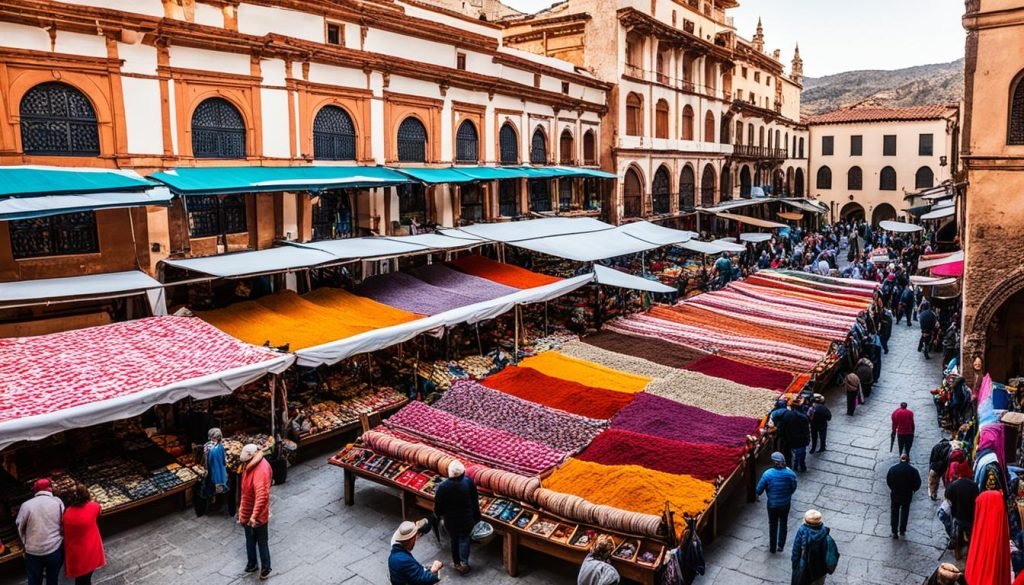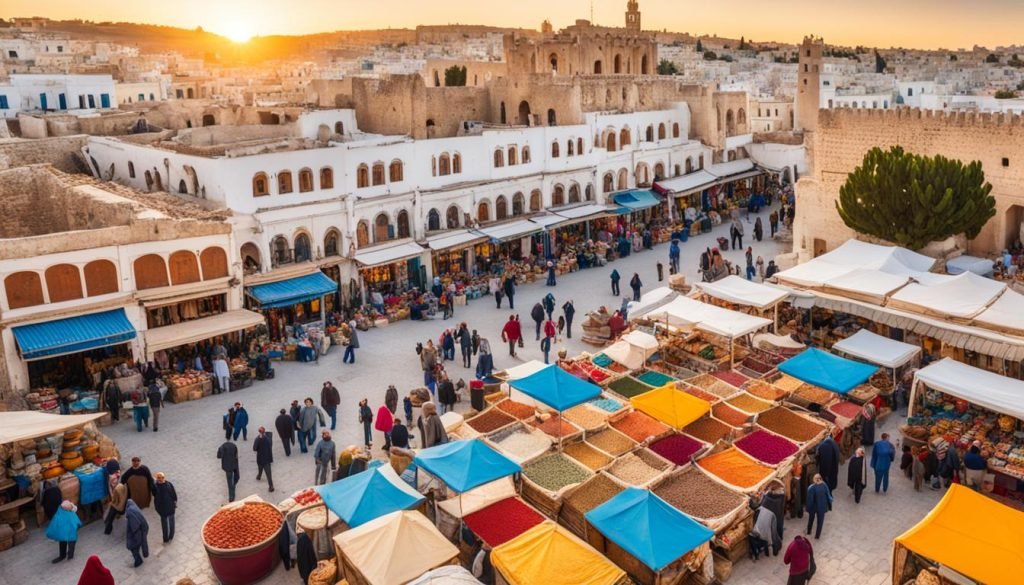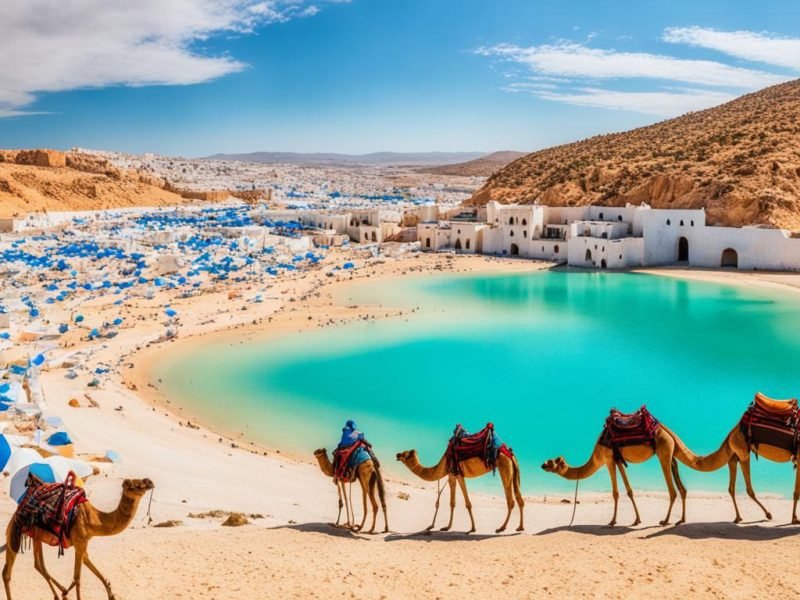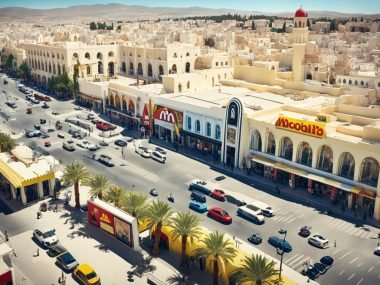I clicked and booked my trip to Tunisia on a whim. I was drawn by North Africa’s charm and good prices. I only knew a little about Tunisia from my search for reviews. I was looking for a nice yet easy trip. But, setting foot there, I was amazed.
I found out Tunisia is much more than I thought. Visiting Hammamet’s beautiful beaches and Tunis’s rich culture was eye-opening. Tunisia is not just cheap. It is rich with history and colors I will always remember. These moments showed me the true worth of my trip.
In this article, we will explore Tunisia together. We’ll see its beautiful shores, ancient buildings, and the lively capital. Let’s discover what makes a Tunisia holiday special.
Key Takeaways
- Tunisia extends far beyond a cost-effective destination; it’s a cultural kaleidoscope waiting to be explored.
- The nation’s rich tapestry is woven from threads of Islamic culture, Roman history, and Mediterranean hospitality.
- Hammamet’s beaches offer untouched Mediterranean beauty, serving as quiet testaments to Tunisia’s complex history.
- The capital, Tunis, is a vibrant mix of history and modernity that captures the heart of Tunisia tourism.
- Experiencing the grand Roman ruins and the story-rich kasbahs is essential to appreciate Tunisia’s multifaceted allure.
- Traveling to Tunisia is to step into a painting where every hue tells a story of civilization, warmth, and the hope of a people embracing their future.
Tunisia Travel Experience: Beyond the Beaches
My trip to Tunisia showed me the country’s rich culture and various holiday experiences. It began with a calm time at Hammamet’s shores. Then, it moved to the lively vibes of Tunis and the historical tales of Tunisian Kasbahs.
The Pristine and Peaceful Beaches of Hammamet
Hammamet’s beaches are truly stunning. The waters are clear and the sand is untouched. This place lets you enjoy beauty and peace, making it a big part of my trip.
Discovering the Cultural Gem of Tunis, the Capital City
Tunis, the capital, was a lively change from Hammamet. It’s the heart of Tunisia culture. The city has many historical sites like the Antoninus Baths from the Roman times.
Adventures in Tunisian Kasbahs and the Lure of Colorful Doors
The Kasbahs in Tunisia, especially in Tunis, tell the nation’s history. Each door tells a story, with bright colors and lasting through time. They show a unique side of Tunisia.

The Cultural Landscape of Tunisia: A Blend of History and Modernity
Tunisia’s cultural landscape is both old and new. It has historic sites and modern life. You can see this mix in Tunis, Carthage, and Kairouan.
The Great Mosque of Kairouan is very important in Tunisia. It is a key mosque and shows Tunisia’s rich history. The mosque and new steps in education show Tunisia’s growth. They blend the past with the future.
Tunisia also cares a lot about democracy. This was clear after the Arab Spring. The National Dialogue Quartet won the Nobel Peace Prize. It shows Tunisia’s big role in democracy in the Arab world.

In Tunisia, old and new live together. Ruins of Carthage stand near a busy metro. Markets sell both modern gadgets and traditional items. This mix makes Tunisia special and teaches about change over time.
| Historical Sites | Modern Contributions |
|---|---|
| Great Mosque of Kairouan | Advancements in women’s rights and education |
| Ancient Carthage | Democratic growth post-Arab Spring |
| Traditional Souks | Modern retail spaces and tech outlets |
Every visit to Tunisia shows me how history and modern life come together. This blend attracts people and scholars. It makes Tunisia a place where culture and new times meet.
How Good Is Tunisia? Unveiling My Personal Journey
My trip to Tunisia started with lots of excitement. I had heard many wonderful stories about its beauty and friendly people. The experience was just as amazing as I hoped. I found myself surrounded by warmth, not just from the sun but the people too. Every city told its own story, filled with lively moments and friendly faces.
Using the local buses let me really see what life in Tunisia is like. I saw how kind everyone is to each other. This kindness made me respect and love Tunisia even more. I felt closer to the local way of life, seeing the true heart of the country.
In Tunisia, people really care about each other. They made sure I was safe and happy. This wasn’t just to be nice to tourists. They truly wanted me to fall in love with Tunisia. This made my trip feel like more than just a holiday. It was a special cultural exchange.
One time, an old man helped me with the bus routes. He didn’t just tell me where to go. He walked with me to make sure I got on the right bus. This kind of help was common during my visit. It showed me the true spirit of Tunisia.
What makes a trip to Tunisia special is its culture and honesty. It’s not just a vacation. It’s a chance to connect and understand deeply. If you’re wondering ‘Is Tunisia worth visiting?’—my answer is yes. It’s a journey that will touch your heart.
Gastronomic Delights: Savoring Tunisia’s Culinary Offerings
Exploring Tunisia’s food is like exploring a world of flavors. It reflects the country’s rich history and its love for the Mediterranean. Every dish is a celebration of textures and spices. These foods show the heart of Tunisia’s food culture. You can find them in lively markets and quiet coastal places. My journey into Tunisia’s cuisine showed me much about the nation’s spirit.
Traditional Tunisian Dishes to Indulge In
I got to try many traditional dishes in Tunisia. Each meal was more than just food – it was a cultural experience. Harissa added a fiery taste to meals, making each bite warm and exciting. Dishes like couscous showed how grains can mix with seafood or stews. Brik was a true standout. It’s a delicate pastry with tuna and an egg, showing Tunisia’s bold food story.
The Freshness of Mediterranean Cuisine in Tunisia
Tunisia’s Mediterranean dishes also amazed me. I tried a Tunisian salad with fresh tomatoes, onions, and cucumbers. Local olive oil made it even better. This showed how much Tunisia loves its fresh produce. Each dish, like the tasty green stew Mloukhia, was rich in flavor. Even Chacha, the local drink, added to the experience. These flavors together tell the story of Tunisia.







